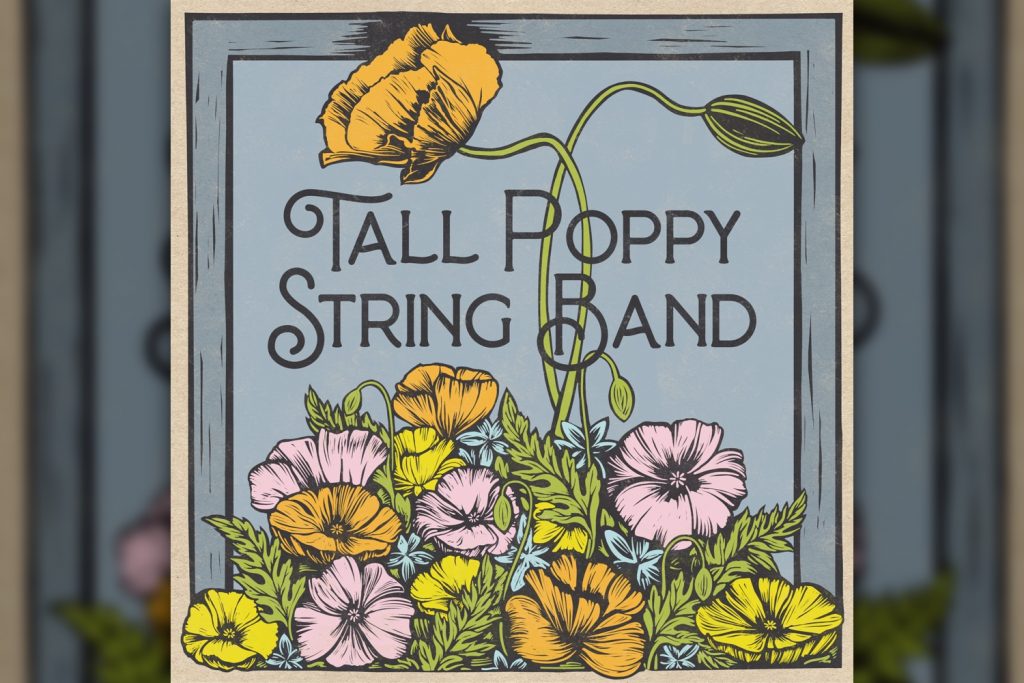Album Review: Queering the Past with ‘Tall Poppy String Band’
By Christopher Treacy

The self-released, self-titled Tall Poppy String Band arrived at the end of July and it is truly a treasure. There’s a reason why these folks had such a successful kickstarter campaign (and also scored a mini-grant from Bluegrass Pride) — the near-virtuosic musicianship speaks for itself.
Think of TPSB as a an old-timey, queer supergroup: Cameron DeWhitt (they/them) on banjo, Mark Harris (they/them) on guitar, and George Jackson (he/him) on fiddle. All three are involved in multiple musical projects and each brings their own musical personality to the table in this creative tour de force.
Intermittently majestic and mournful, the breadth of the album’s emotional palette is wide, but it can take multiple listens for the variations to sink in. Many of us have become used to being told how to feel through song lyrics that all too often don’t leave enough to the imagination. But what if the cues were purely musical, with no lyrical guideposts? This is something at which jazz enthusiasts are more adept. TPSB offers up no less than seven instrumentals here that call on us to listen in ways we may not be used to, but the payoff is well worthwhile.
Opener “Old Cow Died” is a ferocious, galloping string ride with stately vistas, tempered by bits of tension from sharp curves ala Jackson’s fiddle, while “The Coo Coo” flows over like rushing water. Both are exhilarating. The mental imagery that comes to mind is telling: fields of wheat, big skies, woodsy grottos, and babbling streams. “Old Cow Died” is rife with earth tones, while “The Coo Coo” revels in deep greens and blues, led by Harris’s alternately tuned guitar.
“Pride of America” is more challenging to pinpoint—ambiguous. It doesn’t sound particularly prideful, but pride manifests itself differently depending on the context, which is something we’ll probably never know more about since the song’s origin dates back to the 1800s. The lack of tangible intent keeps us going back for more, however, hunting for clues. Is it patriotic? Does it turn patriotism on its head? Is it about a prize-winning cow? An early LGBTQA+ anthem? You decide.
It may not be obvious on the surface, but make no mistake: as an album, Tall Poppy String Band is hella-queer. Sometimes it achieves its queerness by celebrating the so-called underdog. The arrangements chosen are always off the beaten path, favoring unstandardized tunings and rhythmic oddities galore. “Old Cow Died” and “The Coo Coo,” for instance, both stick to versions rendered by musicians of color. “A Man of Constant Sorrow,” meanwhile, is not the Oh Brother Where Art Thou fare that most are familiar with, but rather a doleful, melancholic version that more synonymously matches the narrative while Jackson’s lead vocal wraps the lyric around the arrangement in clever, unexpected ways.
As DeWhitt pointed out when we spoke to them earlier this summer about “The Train That Carried My Man From Town,” (née, “…Girl From Town”), the original is chock full of misogyny and incel-like levels of hostility. It all happens so fast, you’ll miss it if you aren’t paying attention. In this case, DeWhitt queers the song by incorporating a new level of awareness about its problematic narrative, shifting the gender for more altruistic ends.
The album’s centerpiece, “Springtime of Life,” is one of the non-traditional song choices, written by Ola Belle Reed (1916-1922). DeWhitt takes lead vocals here and queers the song by singing in their most masculine register. From there, the story does the rest of the work, framing a tale about—as DeWhitt states in the liner notes—”…the pressure to forfeit pleasure and fulfillment to satisfy normative values,” rendering the relationship depicted, “…a casualty of cultural demands.” The results are stunning. The drama, desire, and eventual betrayal are palpable. Especially when contrasted with the song’s inherently rustic feel, hearing what sounds like a man retelling the love story from a same-sex perspective creates the disc’s most compelling moments.
Only one original made the collection—striking for how seamlessly it fits in among the otherwise old-time choices. According to the liner notes, Mark Harris’s “Gonna Make a Killing” explores that relatable frame of mind when we’re fantasizing about geographical cures. Most of us discover that wherever we go, there we are, baggage in hand. But Harris’s song embodies the timeless lure of ‘brighter days ahead’ in a new locale, transcending modern thinking with a universal daydream. The unbridled optimism is contagious, even if we know it’s probably doomed.
In a world where modern production sands away so much precious personality in music, seldom are we blessed with an album as organically impressive. TPSB has achieved something truly unique, sounding unlike anything else that’s come through the gates at CQ in forever. Curiously, they manage this feat by mining the past… and making it their own.
Christopher Treacy has been writing about music and the music industry for 20 years. He’s contributed to The Boston Phoenix, The Boston Herald, Nashville Scene, and Berklee College of Music’s quarterly journal, as well as myriad LGBTQ+ outlets including the Edge Media Network, Between the Lines/Pride Source, Bay Windows and In Newsweekly. He lives in Waitsfield, VT.